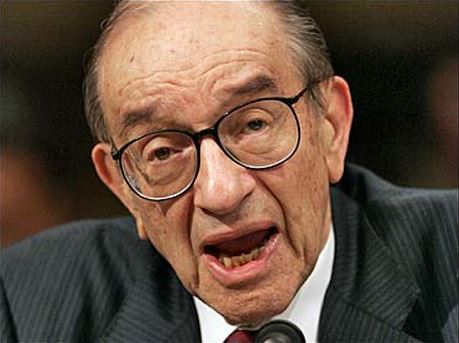The question now is not whether Grexit (Greece exiting from the euro) will occur, but when, says former Federal Reserve Chair Alan Greenspan, given that nobody is willing to risk lending money to the country now.
Mr. Greenspan, who was Chairman of the Federal Reserve of the United States from 1987 to 2006, said just hours before Greece’s Prime Minister Alexis Tsipras was due to explain how his government would carry on paying its bills, that the country’s disastrous situation will never be resolved if it stays in the Eurozone.
In a BBC radio interview on Sunday (listen to it at the bottom of this page), Mr. Greenspan said:
“I don’t see that it helps them to be in the euro and I certainly don’t see that it helps the rest of the Eurozone. I think it’s just a matter of time before everyone recognizes that parting is the best strategy.”

Mr. Greenspan believes European monetary union is flawed because there isn’t total political union.
“The problem is that there there is no way that I can conceive of the euro of continuing, unless and until all of the members of eurozone become politically integrated – actually even just fiscally integrated won’t do it.”
Greece has a public debt of €320 billion ($362 billion, ₤237 billion), which represents around 175% of its GDP (gross domestic product).
Mr. Greenspan’s comments come just before the G-20 finance ministers meet in Istanbul on Monday, and Eurozone officials get together to discuss what to do about Greece on Tuesday.
If Greece fails to get further loans it will default and exit the euro, Mr. Greenspan explained. “At this stage, I don’t see any people who are willing to put up the funds, having been disappointed so often.”
When asked whether he supported Germany’s firm stance – refusing to succumb to Greek government demands for new terms – Mr. Greenspan said “I certainly do.”
Greenspan’s Eurozone total integration message not a new one
Three years ago Mr. Greenspan warned that without total political union the Eurozone was doomed to fail.
In an interview in May 2012 with the Financial Post, Mr. Greenspan said:
“At the moment, northern Europe finances southern Europe. There is tax evasion and illegal commerce in Greece, Italy, Portugal and Spain. The European Central Bank is printing money to finance all the shortfalls in fiscal deficits of southern Europe.”
“This has to stop at some point and when it stops, you are going to have a major confrontation of the euro and all countries will have to make a fundamental choice. The only resolution is political union of the Eurozone countries.”
Last month, Bank of England Governor Mark Carney said that for the euro to work, the whole Eurozone needs to share decisions on spending and taxes.
During a lecture in Dublin, Ireland, Mr. Carney said:
“For complete solutions to current and potential future problems the sharing of fiscal risks is required … Without this risk sharing, the euro area finds itself in an odd position. As the Presidents of the European Council, European Commission, Eurogroup and European Central Bank argued in their report, European Monetary Union will not be complete until it builds mechanisms to share fiscal sovereignty.”
British Chancellor George Osborne said his country is getting ready for a possible Grexit. If Greece either leaves or is kicked out of the Eurozone, the UK will need to be prepared for the market instability that the event could trigger, he said.
BBC Radio 4 Interview with Alan Greenspan

